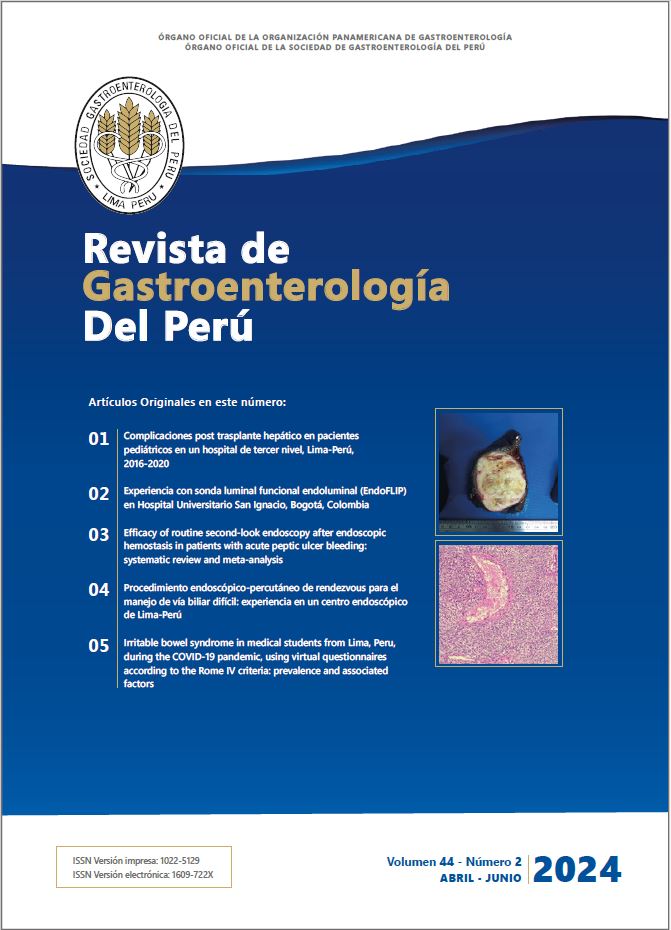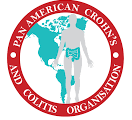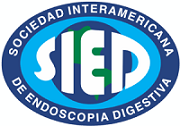Utilization of Upadacitinib in the treatment of Crohn's disease: a report on two clinical cases
DOI:
https://doi.org/10.47892/rgp.2024.442.1686Keywords:
Crohn disease, Inflammatory bowel diseases, Janus kinases, TreatmentAbstract
Crohn’s disease (CD) is a chronic, progressive inflammatory disease with complications that impact the well-being of patients. The therapeutic advances achieved in recent decades, especially through the advent of biological therapy, have allowed for a transformation in the approach and management of CD, thereby modifying the course of this disease. However, a significant number of patients do not experience a satisfactory response to these drugs or lose it during the course of the disease. In this scenario, a viable alternative is to switch medications. Upadacitinib, a novel Janus kinase inhibitor, has emerged as a promising strategy for the management of CD. We presented two cases of patients with CD refractory to conventional therapy and biological therapy, who responded successfully to treatment with upadacitinib.
Downloads
Metrics
References
Torres J, Mehandru S, Colombel JF. Peyrin-Biroulet L. Crohn’s disease. Lancet. 2017;389(10080):1741-55. doi: 10.1016/S0140-6736(16)31711-1.
Nuñez P, Mahadevan U, Quera R, Bay C, Ibáñez P. Treat to target approach in the management of inflammatory bowel disease. Gastroenterol Hepatol. 2021;44(4):312-9. doi: 10.1016/j.gastrohep.2020.06.032.
Turner D, Ricciuto A, Lewis A, D’Amico F, Dhaliwal J, Grifths AM, et al. STRIDE-II: an update on the Selecting Therapeutic Targets in Inflammatory Bowel Disease (STRIDE) initiative of the International Organization for the Study of IBD (IOIBD): determining therapeutic goals for treat-to-target strategies in IBD. Gastroenterology. 2021;160(5):1570-83. doi: 10.1053/j.gastro.2020.12.031.
Chang S, Murphy M, Malter L. A review of available medical therapies to treat moderate-to-severe Inflammatory Bowel Disease. Am J Gastroenterol. 2024;119(1):55-80. doi: 10.14309/ajg.0000000000002485.
Parigi TL, D'Amico F, Danese S. Upadacitinib for Crohn's disease and ulcerative colitis treatment: Hitting the selective JAKpot. Gastroenterology. 2021;160(5):1472-4. doi: 10.1053/j.gastro.2020.04.034.
Sandborn WJ, Feagan BG, Loftus EV, Peyrin-Biroulet L, van Assche G, D'Haens G, et al. Efficacy and safety of Upadacitinib in a randomized trial of patients with Crohn's disease. Gastroenterology. 2020;158(8):2123-38. doi: 10.1053/j.gastro.2020.01.047.
Traboulsi C, Ayoub F, Silfen A, Rodriguez TG, Rubin DT: Upadacitinib is safe and effective for Crohn's disease: real-world data from a tertiary center. Dig Dis Sci. 2023;68(2):385-8. doi: 10.1007/s10620-022-07582-w.
Loftus EV, Panés J, Lacerda AP, Peyrin-Biroulet L, D'Haens G, Panaccione R, et al. Upadacitinib induction and maintenance therapy for Crohn's disease. N Engl J Med. 2023;388(21):1966-80. doi: 10.1056/NEJMoa2212728.
Danese S, Vermeire S, Zhou W, Pangan AL, Siffledeen J, Greenbloom S, et al. Upadacitinib as induction and maintenance therapy for moderately to severely active ulcerative colitis: Results from three phase 3, multicentre, double-blind, randomised trials. Lancet. 2022;399(10341):2113-28. doi: 10.1016/S0140-6736(22)00581-5.
Panaccione R, Danese S, Zhou W, Klaff J, Ilo D, Yao X, et al. Efficacy and safety of upadacitinib for 16-week extended and 52/week maintenance therapy in patients with moderately to severely active ulcerative colitis. Aliment Pharmacol Ther 2024;59(3):393-408. doi: 10.1111/apt.17816.
Mohamed MF, Bhatnagar S, Parmentier JM, Nakasato P, Wung P, et al. Upadacitinib: Mechanism of action, clinical, and translational science. Clin Transl Sci. 2024;17(1);e13688. doi: 10.1111/cts.13688.
Pineton de Chambrun G, Blanc P, Peyrin-Biroulet L. Current evidence supporting mucosal healing and deep remission as important treatment goals for infammatory bowel disease. Expert Rev Gastroenterol Hepatol. 2016;10(8):915-27. doi: 10.1586/17474124.2016.1174064.
Agrawal M, Spencer EA, Colombel JF, Ungaro RC. Approach to the management of recently diagnosed inflammatory bowel disease patients: a user’s guide for adult and pediatric gastroenterologists. Gastroenterology. 2021;161(1):47-65. doi: 10.1053/j.gastro.2021.04.063.
Calderón P, Núñez P, Nos P, Quera R. Personalized therapy in inflammatory bowel disease. Gastroenterol Hepatol. 2023;S0210-5705(23)00497-1. doi: 10.1016/j.gastrohep.2023.12.006.
Colombel JF, Hisamatsu T, Bresso F, Thin L, Parra R, Ford S, et al. Upadacitinib therapy reduces Crohn’s disease symptoms within the first week of induction therapy [abstract]. In: European Crohn’s and Colitis Organization; March 1–4, 2023; Copenhagen, Denmark: ECCO; 2023. Abstract no. DOP 38. doi: 10.1093/ecco-jcc/jjac190.0078.
Colombel JF, Irvin P, Rieder F, Panaccione R, Schwartz D, Hayashi R, et al. P491. Efficacy and safety of upadacitinib for the treatment of fistulas and fissures in patients with Crohn’s disease. J Crohns Colitis. 2023;17(Suppl 1):i620-3. doi: 10.1093/ecco-jcc/jjac190.0621.
Downloads
Published
How to Cite
Issue
Section
License
Copyright (c) 2024 Rodrigo Quera, Andrea Córdova, Paulina Núñez, Ismael Correa, Lilian Flores

This work is licensed under a Creative Commons Attribution 4.0 International License.
Revista de Gastroenterología del Perú by Sociedad Peruana de Gastroenterología del Perú is licensed under a Licencia Creative Commons Atribución 4.0 Internacional..
Aquellos autores/as que tengan publicaciones con esta revista, aceptan los términos siguientes:
- Los autores/as conservarán sus derechos de autor y garantizarán a la revista el derecho de primera publicación de su obra, el cuál estará simultáneamente sujeto a la Licencia de reconocimiento de Creative Commons que permite a terceros compartir la obra siempre que se indique su autor y su primera publicación esta revista.
- Los autores/as podrán adoptar otros acuerdos de licencia no exclusiva de distribución de la versión de la obra publicada (p. ej.: depositarla en un archivo telemático institucional o publicarla en un volumen monográfico) siempre que se indique la publicación inicial en esta revista.
- Se permite y recomienda a los autores/as difundir su obra a través de Internet (p. ej.: en archivos telemáticos institucionales o en su página web) antes y durante el proceso de envío, lo cual puede producir intercambios interesantes y aumentar las citas de la obra publicada. (Véase El efecto del acceso abierto).




















 2022
2022 